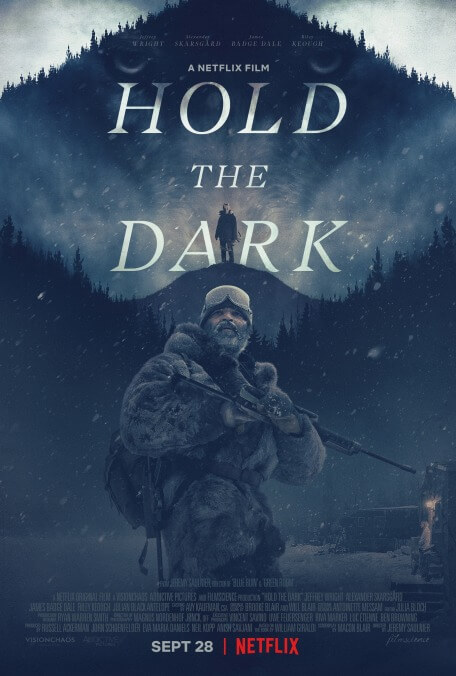Death is never clean in the ruthless off-the-grid thrillers of Jeremy Saulnier. It’s messy and loud and terrifying. Blue Ruin and Green Room, color-coded companion pieces of nightmare violence, sent their unluckiest characters not so gently into that good night. When the end does come (blessedly) quick for one of these corpses-waiting-to-happen, it’s usually with a spectacular splatter of flesh and bone, the damage a rifle does to an unsuspecting face. There’s integrity to how awful the bloodshed tends to be in Saulnier’s movies—not just to the grisly anatomical realism of, say, a machete carving up an arm, but also to the believable emotional and physical toll it takes on the brutalized. And that’s an element the director preserves in his latest study of American mayhem, this one set against an arctic landscape dotted with frozen bodies and speckled with viscera. If Hold The Dark lacks the sheer razor-wire tension of Saulnier’s earlier crime-horror corkers, it still knows how to make the carnage count—to force us to experience, on a gut level, every casualty.
For a while, we could be watching a pay-cable procedural, one of those slow-drip small-town whodunits that are all the rage. (Call it a dry and very cold run to Saulnier’s truncated tenure on the upcoming third season of True Detective.) In far-flung Alaska, a mother, Medora Slone (Riley Keough), loses her child. The apparent culprit: wolves, who may have dragged the boy away, just as they did two other children in her secluded village. Jeffrey Wright, in a rare, deserved leading role, plays Russell Core, the nature writer she contacts, hoping he can use his expertise in hunting wild canines to track down and kill the animals responsible. Medora, he discovers, has been totally numbed by grief. Or is there another explanation for the alien remoteness Keough provides her? It’s matched by the shell-shock of her husband, Vernon (Alexander Skarsgård), who’s off fighting in Iraq—an environment, polar opposite in climate but not despair, that Saulnier drops into for a single harrowing episode.
The dark, savage places the plot goes from here shouldn’t be disclosed. Suffice to say, not everything is as it initially seems, and as a missing-person mystery gradually gives way to a more confounding mystery of motivation, Saulnier follows another ordinary man—a quiet wordsmith, nearly as unequipped for conflict as the amateur vigilante and desperate hardcore band of his last two films—as he gets in further and further over his head. But Hold The Dark doesn’t lock us into a life-and-death ordeal as expertly or elegantly as its predecessors did. Macon Blair, who starred in Saulnier’s Blue Ruin and also won the top prize at Sundance for his uneven black comedy I Don’t Feel At Home In This World Anymore, adapted the unsparing narrative from a novel by William Giraldi. His storytelling is lopsided, moving at a glacial, portentous crawl during the setup passage, before taking a turn for the unrelenting, as the soft-spoken Core ends up paired off with a local lawman (James Badge Dale) during an urgent manhunt. At least the dialogue, attributable to Blair or Giraldi or both, occasionally possesses a back-and-forth, Taylor Sheridan crackle, particularly during the hellish shootout centerpiece.
One misses Saulnier’s grim humor; it might offset all the heart-of-darkness speechifying. Hold The Dark is just plain grim, presenting its senseless killing—a solemn slasher-movie rampage, complete with creepy masked lunatic—as a wave of madness swallowing up a whole frozen backcountry, or maybe the whole damn world. That’s a potent idea in our increasingly deranged now, and it’s admirable, too, the film’s willingness to embrace anticlimax, following a trail of bodies to an inevitable reunion and a perverse ellipses of an ending. But without a strong center (Wright, for all his riveting calm, isn’t playing much of a character), the film mainly gets by on the harsh, startling power of its violence, and the way Saulnier fixates on how people behave while dangling on the precipice of the void. No hushed monologue conflating the true natures of man and beast could compete with the little wounding gestures the director highlights, like a cop instinctively shielding his face seconds before catching a bullet in it, or our hero vomiting at the sight of a body, expressing a moral revulsion characters in hardboiled crime yarns too rarely do.































![Rob Reiner's son booked for murder amid homicide investigation [Updated]](https://img.pastemagazine.com/wp-content/avuploads/2025/12/15131025/MixCollage-15-Dec-2025-01-10-PM-9121.jpg)









